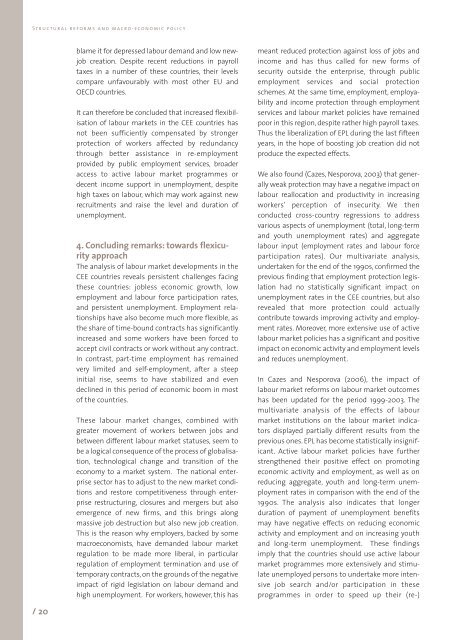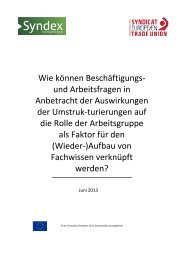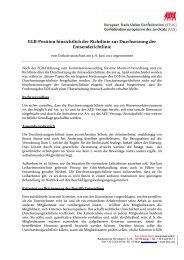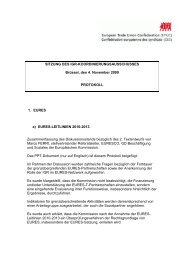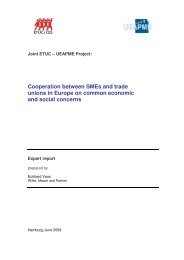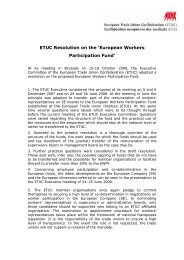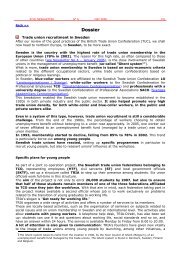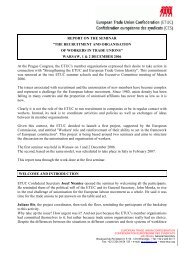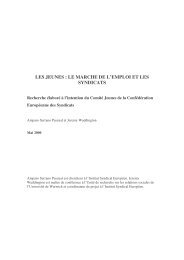Structural reforms and macro-economic policy - ETUC
Structural reforms and macro-economic policy - ETUC
Structural reforms and macro-economic policy - ETUC
You also want an ePaper? Increase the reach of your titles
YUMPU automatically turns print PDFs into web optimized ePapers that Google loves.
<strong>Structural</strong> <strong>reforms</strong> <strong>and</strong> <strong>macro</strong>-<strong>economic</strong> <strong>policy</strong><br />
/ 20<br />
blame it for depressed labour dem<strong>and</strong> <strong>and</strong> low newjob<br />
creation. Despite recent reductions in payroll<br />
taxes in a number of these countries, their levels<br />
compare unfavourably with most other EU <strong>and</strong><br />
OECD countries.<br />
It can therefore be concluded that increased flexibilisation<br />
of labour markets in the CEE countries has<br />
not been sufficiently compensated by stronger<br />
protection of workers affected by redundancy<br />
through better assistance in re-employment<br />
provided by public employment services, broader<br />
access to active labour market programmes or<br />
decent income support in unemployment, despite<br />
high taxes on labour, which may work against new<br />
recruitments <strong>and</strong> raise the level <strong>and</strong> duration of<br />
unemployment.<br />
4. Concluding remarks: towards flexicurity<br />
approach<br />
The analysis of labour market developments in the<br />
CEE countries reveals persistent challenges facing<br />
these countries: jobless <strong>economic</strong> growth, low<br />
employment <strong>and</strong> labour force participation rates,<br />
<strong>and</strong> persistent unemployment. Employment relationships<br />
have also become much more flexible, as<br />
the share of time-bound contracts has significantly<br />
increased <strong>and</strong> some workers have been forced to<br />
accept civil contracts or work without any contract.<br />
In contrast, part-time employment has remained<br />
very limited <strong>and</strong> self-employment, after a steep<br />
initial rise, seems to have stabilized <strong>and</strong> even<br />
declined in this period of <strong>economic</strong> boom in most<br />
of the countries.<br />
These labour market changes, combined with<br />
greater movement of workers between jobs <strong>and</strong><br />
between different labour market statuses, seem to<br />
be a logical consequence of the process of globalisation,<br />
technological change <strong>and</strong> transition of the<br />
economy to a market system. The national enterprise<br />
sector has to adjust to the new market conditions<br />
<strong>and</strong> restore competitiveness through enterprise<br />
restructuring, closures <strong>and</strong> mergers but also<br />
emergence of new firms, <strong>and</strong> this brings along<br />
massive job destruction but also new job creation.<br />
This is the reason why employers, backed by some<br />
<strong>macro</strong>economists, have dem<strong>and</strong>ed labour market<br />
regulation to be made more liberal, in particular<br />
regulation of employment termination <strong>and</strong> use of<br />
temporary contracts, on the grounds of the negative<br />
impact of rigid legislation on labour dem<strong>and</strong> <strong>and</strong><br />
high unemployment. For workers, however, this has<br />
meant reduced protection against loss of jobs <strong>and</strong><br />
income <strong>and</strong> has thus called for new forms of<br />
security outside the enterprise, through public<br />
employment services <strong>and</strong> social protection<br />
schemes. At the same time, employment, employability<br />
<strong>and</strong> income protection through employment<br />
services <strong>and</strong> labour market policies have remained<br />
poor in this region, despite rather high payroll taxes.<br />
Thus the liberalization of EPL during the last fifteen<br />
years, in the hope of boosting job creation did not<br />
produce the expected effects.<br />
We also found (Cazes, Nesporova, 2003) that generally<br />
weak protection may have a negative impact on<br />
labour reallocation <strong>and</strong> productivity in increasing<br />
workers’ perception of insecurity. We then<br />
conducted cross-country regressions to address<br />
various aspects of unemployment (total, long-term<br />
<strong>and</strong> youth unemployment rates) <strong>and</strong> aggregate<br />
labour input (employment rates <strong>and</strong> labour force<br />
participation rates). Our multivariate analysis,<br />
undertaken for the end of the 1990s, confirmed the<br />
previous finding that employment protection legislation<br />
had no statistically significant impact on<br />
unemployment rates in the CEE countries, but also<br />
revealed that more protection could actually<br />
contribute towards improving activity <strong>and</strong> employment<br />
rates. Moreover, more extensive use of active<br />
labour market policies has a significant <strong>and</strong> positive<br />
impact on <strong>economic</strong> activity <strong>and</strong> employment levels<br />
<strong>and</strong> reduces unemployment.<br />
In Cazes <strong>and</strong> Nesporova (2006), the impact of<br />
labour market <strong>reforms</strong> on labour market outcomes<br />
has been updated for the period 1999-2003. The<br />
multivariate analysis of the effects of labour<br />
market institutions on the labour market indicators<br />
displayed partially different results from the<br />
previous ones. EPL has become statistically insignificant.<br />
Active labour market policies have further<br />
strengthened their positive effect on promoting<br />
<strong>economic</strong> activity <strong>and</strong> employment, as well as on<br />
reducing aggregate, youth <strong>and</strong> long-term unemployment<br />
rates in comparison with the end of the<br />
1990s. The analysis also indicates that longer<br />
duration of payment of unemployment benefits<br />
may have negative effects on reducing <strong>economic</strong><br />
activity <strong>and</strong> employment <strong>and</strong> on increasing youth<br />
<strong>and</strong> long-term unemployment. These findings<br />
imply that the countries should use active labour<br />
market programmes more extensively <strong>and</strong> stimulate<br />
unemployed persons to undertake more intensive<br />
job search <strong>and</strong>/or participation in these<br />
programmes in order to speed up their (re-)


